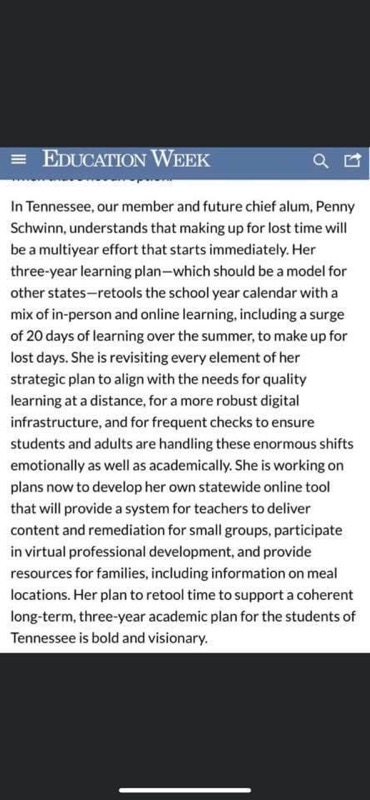Tennessee’s Constitution guarantees a free public education. Specifically, it states, “The state of Tennessee recognizes the inherent value of education and encourages its support. The General Assembly shall provide for the maintenance, support and eligibility standards of a system of free public schools.” Tenn. Const. art. XI, § 12.
David Sciarra of the Education Law Center provides some insight into what constitutional guarantees to public education — like the one included in Tennessee’s Constitution — mean in the time of a global pandemic.
In the wake of closing physical school buildings and classrooms, states are legally mandated to educate all students while they are sheltering at home, regardless of student need or the conditions in the district in which they are enrolled. And this affirmative duty means that states cannot simply pass the buck to school districts to figure out how to respond to the impact of COVID-19 on their students and teachers, nor to shoulder on their own the responsibility for continuing instruction by remote, digital means.
To fulfill their Education Article duty during the COVID-19 school closure, the states, through their education agencies (SEAs), must take these minimum proactive steps:
- Issue robust emergency guidance to school districts requiring the continuation of student learning through remote means and equitable opportunities for all students to access remote learning. The guidance must be comprehensive, addressing the full range of challenges faced by school districts, including addressing the specific legal rights and needs of students requiring interventions and supports, such as students with disabilities, English language learners, homeless students, students in foster care and those academically at-risk.
- Provide intensive assistance to those districts serving high enrollments of low-income students and students of color to address the “digital divide” resource gaps that disproportionately affect these groups of students and impede delivery of remote instruction, including lack of internet access and devices and the need for online learning platforms, professional supports for teachers and other crucial assistance.
- Collect data from districts on the extent of the “digital divide” with a focus on low-income students and students of color and make the data publicly available on a rolling basis.
- Launch and implement a statewide campaign to make certain every student in need has access to meals and other supportive services while at home.
- Issue guidance on district use of federal CARES Act emergency relief funds, prioritizing digital resource gaps and publicizing district plans for use of those funds.
- Begin planning, through a statewide task force or work group, for appropriate supports to be in place when schools reopen, including the need for significant resources to compensate for student learning loss during school closure and support services for students experiencing trauma.
- Ensure all public funds, including federal funds, are used exclusively to maintain and support the public education system and are not diverted to private virtual schools, tutoring services or other private education uses.
States are constitutionally obligated to make certain all children, no matter their life circumstances, have access to learning opportunities during the pandemic, and that students return to schools that are fully resourced and ready to meet their short- and long-term educational needs. Information on these resource needs will be crucial to inform the difficult budgetary decisions legislators and governors must make in the coming months, given the staggering fallout from the pandemic on state and local revenues.
The bottom line is this: states cannot close school buildings and then fail to educate children or permit and tolerate educational disparities among districts or vulnerable student populations. The constitutional obligation to provide public education belongs to the state, and only the state, and this responsibility cannot – and must not – be left to local district discretion, conditions or circumstances.
Privatizing Prowlers
Sciarra takes an opportunity here to caution against those who seek to profit from the pandemic by privatizing public schools. He notes that states should:
Ensure all public funds, including federal funds, are used exclusively to maintain and support the public education system and are not diverted to private virtual schools, tutoring services or other private education uses.
Meanwhile, we’ve seen our Tennessee profiteer friends at Pearson and K12, Inc. taking steps to use the COVID-19 crisis to grab even more taxpayer dollars with little accountability or oversight.
As the Tennessee General Assembly grapples with how to handle the inevitable budget challenges created by the current emergency, it’s important to remember Sciarra’s warning. The State of Tennessee MUST provide the resources necessary for a free public education for ALL students. This means directing necessary funds to local districts rather than simply relying on them to “make up the difference” between state funding and student needs.

For more on education politics and policy in Tennessee, follow @TNEdReport
Your support — $5 or more today — makes publishing education news possible.








